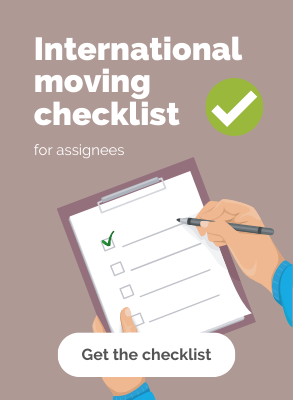Relocating employees across the globe is more than a logistical challenge; it's a significant investment in people and their performance and requires a thoughtful approach to balance the diverse priorities of modern business such as cost management, talent acquisition and retention, diversity and inclusion, and employee wellbeing.
While core relocation services like visa and immigration, shipping, support finding a new home and provision for temporary accommodations are typically standard, leading organisations are recognising that a more holistic approach—one that addresses the wider needs of employees and their families—can deliver significant benefits.
The case for recognising family care in relocation programmes
Reducing Assignment Refusal and Failure
Whether it's a rejected assignment or issues further down the line, Employee relocations often falter due to unmet family needs. Recent studies highlight the scale of the impact:
- 62% of companies state the potential negative impact on family life is a key personal barrier to taking up an international assignment (including impact on family life, partner's career and children's education). (Source: Vialto: The New Work Journey Survey (2023).
- 25% of relocating families cite family well-being as a key reason for dissatisfaction during relocation (Expat Valley, 2023).
- 74% of failed assignments stem from unhappy partners, while 38% are due to challenges with children (Source: EY Relocating Partner Survey, 2023).
When you consider the direct and indirect costs of a failed assignment these are important areas to reduce risk.
.jpg?width=640&height=427&name=Unhappy%20child%20-%20pexels-gabby-k-7114109%20(1).jpg) Photo by Monstera Production.
Photo by Monstera Production.
Improving Productivity
Lost productivity during relocation is another significant concern. According to Benivo’s whitepaper (Reducing the $ 30 million Cost of Unsupported Moves in Employee Relocation 2024), one-third of lost productivity, estimated at $2,300 per assignment, is tied to the needs of accompanying family members. Redirecting these costs toward family-focused services could protect productivity and deliver additional ROI through increased employee engagement and loyalty.
Enhancing Diversity, Equity, and Inclusion (DE&I)
Historically some relocation policies have failed to address the needs of diverse family structures, including single parents, dual-career couples, and families with additional support needs. For example:
- Female respondents consistently report lower satisfaction with relocation experiences than male respondents, with a Net Promoter Score of +5 compared to +42 (Source: Expat Valley, 2023).
- Albeit often unintentionally, assumptions that a spouse/partner will take on the mental load of managing family needs often disadvantage non-traditional families (Source: RES Forum DE&I Report 2024).
Tailored policies that consider diverse needs can foster a more inclusive relocation experience.
Creating a Supportive Relocation Experience for Employees
The advantages of providing comprehensive support for the entire family during relocation are evident, but how can organisations effectively implement this? Here are a few suggestions:
Enhance core relocation services with additional support
Assuming the organisation already provides core services such as Visa and Immigration, Household Goods Moving, Home Search, Temporary Accomodation and Education Support you could also consider some of the following areas to elevate the support you provide:
- Family-specific needs assessment allowing you to tailor support based on unique family needs, and to educate the employee on what they should be considering and preparing for.
- Information and resources to help families navigate supporting their children emotionally.
- Partner Support Services - such as assistance in finding a new job to maintain career continuity in the host location, or opportunities for volunteering and social engagement to help them integrate into the new community.
- Practical tools to ease the relocation process, for example, a welcome kit or games and activities that promote communication about the relocation (we've got some great free tools in our Children's Support Advice Centre)
- Personalised communications with the family to foster inclusion, such as writing a pre-assignment letter to accompanying children to help them understand the purpose of the relocation.

Extend support services to the whole family
Evaluate whether any of the services provided to the employee could also be advantageous for the entire family if extended to encompass partners and children. For instance:
- Language Training
- Cultural Awareness Training
- Settling in Support (e.g. if a child wants to do sport this might need more support in certain locations than others for example by making introductions to Sports Clubs).
Consider DEI
Are your policies written with diverse families in mind? Do they still provide enough support when viewed through the lens of a single parent, a dual career family, LGBTQ+ families, or those with additional needs, etc.?
Tailored Programs
Customised solutions for those with unique needs, or high-profile assignees can ensure everyone feels valued and are supported in the best way for them to support assignment success.
Don't cut off support too soon
How often do you check in with employees after the initial relocation is complete? Are you able to offer additional support if risk factors emerge a few months down the line? For example, if a child is having difficulty adjusting to school can you refer to an expert for additional support? If a spouse is struggling to integrate into the community could offering additional settling-in or career support make a difference before it becomes a significant problem?
Next Steps: Building the Case
By investing in enhanced relocation support, your organisation can protect its investment in global talent while creating a more inclusive and supportive workplace culture.
Here's some steps we recommend to get started:
1. Benchmark Performance:
- Survey your relocating employees and their families to understand gaps in your current offerings. Collect data and reflect on your programme's existing offerings by combining three perspectives – organisation, employee, and families as well as market trends. Get support with your Family Relocation Experience survey here.
- Compare your programs against industry standards.
2. Stay Informed and Understand Best Practices
- Partner with experts like Bournes and Expat Valley to identify trends and opportunities for improvement.
- Check Out Our Resources, including our Children’s Relocation Advice Centre.
- Sign up for the Expat Valley newsletter for free resources for families and professionals to stay informed on industry best practices. Sign up here.
3. Engage with Experts:
- Schedule a consultation with Employee Relocation Service Providers to explore the support available to you, and the tailored solutions that could help for your organisation.
 Photo by Edmond Dantès
Photo by Edmond Dantès
How Bournes Can Help
At Bournes Relocation Solutions, we specialise in delivering end-to-end relocation services that meet the diverse needs of employees and their families. With truly personalised family support our services ensure a smooth transition and sustained productivity.
Ready to explore enhanced relocation solutions?
- Contact Us to schedule a consultation.
- Find out more about the Employee Relocation Services we offer.
GMPD members – don’t forget to submit your learning log to gain GMPD points for this learning activity.








